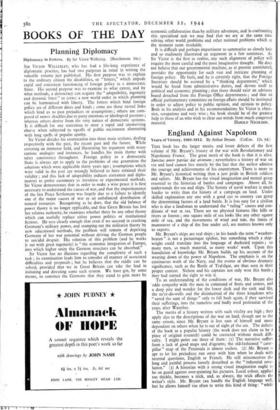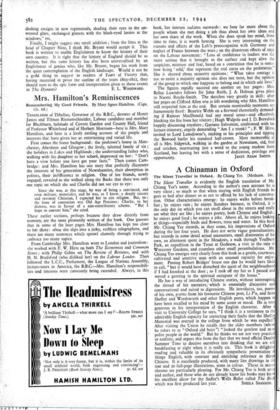England Against Napoleon
Years of Victory, 1803-1812. By Arthur Bryant. (Collins. 12s. 6d.)
THIS book has the larger merits and lesser defects of the first volume of Mr. Bryant's history of the war with Revolutionary and Napoleonic France. The great merit of the book is that it is alive. Sanctus amor patriae dat animum ; nevertheless a history of war on sea and land cannot live merely by the fact that the author admires the courage and achievements of his countrymen. There is more to Mr. Bryant's historical writing than a just pride in British soldiers and sailors. Mr. Bryant has the visual imagination and mental grasp essential to the historian of battles and campaigns. Above all, he understands the sea and ships. The history of naval warfare is much harder to write than the history of a campaign on land. Under skilled explanation any one with a good eye to country can grasp the determining factors of a land battle. It is less easy for a civilian who is also a landsman to understand the " ruling " causes and con- ditions of war at sea. There are no physical features like hills or rivers or forests ; one square mile of sea looks like any other square mile of sea, and the movements of wind and tide, the limits of manoeuvre of a ship of the line under sail, are matters known only to experts.
Mr. Bryant's ships are real ships; his hands the term "weather- beaten " is not a picturesque epitet, but something which a ship- wright could translate into the language of dockyard repairs ; so many men, so much material, so many weeks' work. Upon this foundation of knowledge Mr. Bryant builds up his account of the wearing down of the power of Napoleon. The emphasis is on the continuous work of the Navy, and the events of obvious dramatic significance, such as the Battle of Trafalgar, are thus seen in their proper context. Nelson and his captains not only won this battle ; they had earned the right to win it.
To an understanding of the conditions of war, Mr. Bryant also • adds sympathy with the men in command of fleets and armies, and a deep pity and wonder for the lower deck and the rank and file, the ne'er-do-wells and the disinherited of the three kingdoms who " saved the sum of things " only to fall back again, if they survived their sufferings, into the nameless and badly used proletariat of the years after Waterloo.
The merits of a history written with such vitality are high ; they apply also to the descriptions of the war on land, though not to the same extent, since Mr. Bryant is less sure of himself and more dependent on others when he is out of sight pf the sea. The defects of the book as a popular history (the work does not claim to be a piece of original research) could be corrected without much diffi- culty. I might point out three of them : (i) The narrative suffers from a lack of good maps and diagrams; the old-fashioned " cater- pillar" map of the Peninsula is almost useless. (2) Mr. Bryant is apt to let his prejudices run away with him when he deals with internal questions, English or French. He still misconceives the long and painful process loosely described as the " industrial revo- lution." (3) A historian with a strong visual imagination ought to be on guard against over-painting his pictures. Local colour, applied too thickly, becomes a trick, and, as always, the trick affects the writer's style. Mr. Bryant can handle the English language well, but he allows himself too often to write this kind of thing: "while
dashing ensigns in new regimentals, shading their eyes in the un- wonted glare, exchanged glances with the black-eyed lassies at the windows," etc.
Finally, I might suggest one small addition ; from the lines at the head of Chapter Nine, I think Mr. Bryant would accept it. This book is written to enable Englishmen to know the history of their own country. It is right that the history of England should be so written, but this same history has also been universalised by an Englishman of genius who, like Mr. Bryant, began his work from the quiet contemplation of the English landscape. Would it not be a gold thing to suggest to readers of Years of Victory that, having mastered in prose the outline of the years 1803-1812, they should turn to the epic form and interpretation given to these events



























 Previous page
Previous page